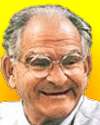 (source)
(source)
|
Victor Weisskopf
(19 Sep 1908 - 21 Apr 2002)
Austrian-American theoretical physicist and administrator who was a major contributor in the golden age of quantum mechanics. He joined the Manhattan Project at Los Alamos in 1943, where he became associate head of the theoretical division. He served as director-general of CERN, the high-energy particle research center (1961-65).
|
Science Quotes by Victor Weisskopf (13 quotes)
Almost all of the material phenomena which occur under terrestrial conditions are recognized as quantum mechanical consequences of the electrical attraction between electrons and nuclei and of the gravitational attraction between massive objects. We should be able, therefore, to express all the relevant magnitudes which characterize the properties of matter in terms of the following six magnitudes: M, m, e, c, G, and h; M is the mass of the proton, m and e are the mass and electrical charge of the electron, c is the light velocity, G is Newton's gravitational constant, and—most importantly—h is the quantum of action.
— Victor Weisskopf
In 'Of Atoms, Mountains, and Stars: A Study in Qualitative Physics' (21 Feb 1975), Science, 187 No. 4177, 605.
But science and technology are only one of the avenues toward reality; others are equally needed to comprehend the full significance of our existence. Indeed, these other avenues are necessary for the prevention of thoughtless and inhuman abuses of the results of science.
— Victor Weisskopf
In The Privilege of Being a Physicist (1989).
Conferences with open attendance are very important for the stimulation of young people or other people who are new in the field. … The field of high-energy physics is, as you know, very strongly in the hands of a clique and it is hard for an outsider to enter.
— Victor Weisskopf
From Letter to J. Howard McMillen (14 Mar 1960), in collection of Raymond Thayer Birge, Correspondence and Papers, Box 29, Folder 'Weisskopf, Victor Frederick, 1908-', Bancroft Library, University of California, Berkeley. As quoted and cited in David Kaiser, Drawing Theories Apart: The Dispersion of Feynman Diagrams in Postwar Physics (2009), 336.
In man’s brain the impressions from outside are not merely registered; they produce concepts and ideas. They are the imprint of the external world upon the human brain. Therefore, it is not surprising that, after a long period of searching and erring, some of the concepts and ideas in human thinking should have come gradually closer to the fundamental laws of the world, that some of our thinking should reveal the true structure of atoms and the true movements of the stars. Nature, in the form of man, begins to recognize itself.
— Victor Weisskopf
In Knowledge and Wonder (1962).
It is possible to apply statistical methods to the calculation of nuclear processes provided that the energies involved are large in comparison with the lowest excitation energies of nuclei.
— Victor Weisskopf
First sentence from Abstract to 'Statistics and Nuclear Reactions', Physical Review (1937), 52, No. 4, 295–303.
Pauli … asked me to tell him what was happening in America. I told him that Mrs. Wu is trying to measure whether parity is conserved. He answered me: “Mrs. Wu is wasting her time. I would bet you a large sum that parity is conserved.” When this letter came I already knew that parity is violated. I could have sent a telegram to Pauli that the bet was accepted. But I wrote him a letter. He said: “I could never let it out that this is possible. I am glad that we did not actually do the bet because I can risk to lose my reputation, but I cannot risk losing my capital.”
— Victor Weisskopf
In Discussion after paper presented by Chien-Shiung Wu to the International Conference on the History of Original Ideas and Basic Discoveries, Erice, Sicily (27 Jul-4 Aug 1994), 'Parity Violation' collected in Harvey B. Newman, Thomas Ypsilantis (eds.), History of Original Ideas and Basic Discoveries in Particle Physics (1996), 381.
Self-confidence is an important ingredient that makes for a successful physicist.
— Victor Weisskopf
From 'Growing Up With Quantum Field Theory: The Development of Quantum Electrodynamics', collected in Laurie M. Brown and Lillian Hoddeson (eds.), The Birth of Particle Physics (1983, 1986), 75. The book is based on the presentations and discussions at the May 1980 International Symposium on the History of Particle Physics, held at Fermi National Accelerator Laboratory in Batavia, Illinois.
The famous principle of indeterminacy is not as negative as it appears. It limits the applicability of classical concepts to atomic events in order to make room for new phenomena such as the wave-particle duality. The uncertainty principle has made our understanding richer, not poorer; it permits us to include atomic reality in the framework of classical concepts. To quote from Hamlet: “There are more things in heaven and earth, Horatio, than are dreamt of in your philosophy.”
— Victor Weisskopf
In Scientific American as quoted in epigraph, in Barbara Lovett Cline, The Questioners: Physicists and the Quantum Theory (1965), 235. Weisskopf was replying to James R Newman’s statement beginning “In this century the professional philosophers…” on this site’s webpage of James R. Newman Quotations.
The Judeo-Christian tradition describes the beginning of the world in a way that is surprisingly similar to the scientific model. Previously, it seemed scientifically unsound to have light created before the sun. The present scientific view does indeed assume the early universe to be filled with various kinds of radiation long before the sun was created.
— Victor Weisskopf
In concluding paragraph of 'The Origin of the Universe: An introduction to Recent Theoretical Developments That are Linking Cosmology and Particle Physics', American Scientist (Sep-Oct 1983), 71, No. 5, 480.
The question of the origin of the universe is one of the most exciting topics for a scientist to deal with. It reaches far beyond its purely scientific significance, since it is related to human existence, to mythology, and to religion. Furthermore, it deals with questions are connected with the fundamental structure of matter, with elementary particles.
— Victor Weisskopf
Opening sentences of 'The Origin of the Universe: An introduction to Recent Theoretical Developments That are Linking Cosmology and Particle Physics', American Scientist (Sep-Oct 1983), 71, No. 5, 473.
The value of fundamental research does not lie only in the ideas it produces. There is more to it. It affects the whole intellectual life of a nation by determining its way of thinking and the standards by which actions and intellectual production are judged. If science is highly regarded and if the importance of being concerned with the most up-to-date problems of fundamental research is recognized, then a spiritual climate is created which influences the other activities. An atmosphere of creativity is established which penetrates every cultural frontier. Applied sciences and technology are forced to adjust themselves to the highest intellectual standards which are developed in the basic sciences. This influence works in many ways: some fundamental students go into industry; the techniques which are applied to meet the stringent requirements of fundamental research serve to create new technological methods. The style, the scale, and the level of scientific and technical work are determined in pure research; that is what attracts productive people and what brings scientists to those countries where science is at the highest level. Fundamental research sets the standards of modern scientific thought; it creates the intellectual climate in which our modern civilization flourishes. It pumps the lifeblood of idea and inventiveness not only into the technological laboratories and factories, but into every cultural activity of our time. The case for generous support for pure and fundamental science is as simple as that.
— Victor Weisskopf
In 'Why Pure Science?' in Bulletin of the Atomic Scientists, 1965.
There are three kinds of physicists, as we know, namely the machine builders, the experimental physicists, and the theoretical physicists. If we compare those three classes, we find that the machine builders are the most important ones, because if they were not there, we could not get to this small-scale region. If we compare this with the discovery of America, then, I would say, the machine builders correspond to the captains and ship builders who really developed the techniques at that time. The experimentalists were those fellows on the ships that sailed to the other side of the world and then jumped upon the new islands and just wrote down what they saw. The theoretical physicists are those fellows who stayed back in Madrid and told Columbus that he was going to land in India.
— Victor Weisskopf
As quoted, without source, in Heinz R. Pagels, 'The Voyage Into Matter', The Cosmic Code: Quantum Physics as the Language of Nature (1982), Part 2, 198.
We…know…that the smallest units of many materials are not atoms but molecules, which are groups of atoms, closely bound to each other. If we are to understand the structure of matter, we must understand not only the structure of atoms but also the reason atoms join and form molecules. We must understand what is called the chemical bond, which keeps the atoms together within the molecule, and we must get acquainted with a few typical molecules and their properties. The chemical bond and the properties of molecules are the subjects of chemistry.
— Victor Weisskopf
In 'The Chemical Bond', Knowledge and Wonder (1962, Rev. ed. 1966), 142.
See also:
- 19 Sep - short biography, births, deaths and events on date of Weisskopf's birth.
- The Joy Of Insight: The Passions of a Physicist, by Victor Weisskopf. - book suggestion.
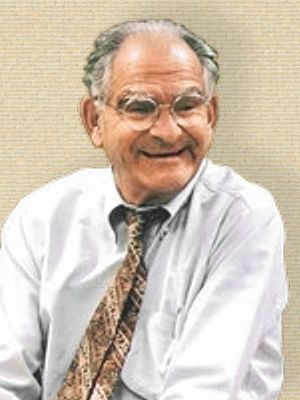
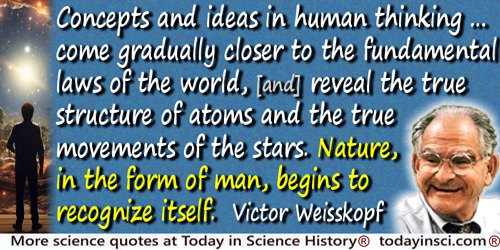

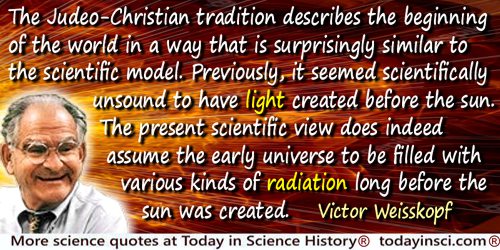



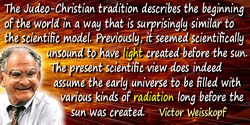
 In science it often happens that scientists say, 'You know that's a really good argument; my position is mistaken,' and then they would actually change their minds and you never hear that old view from them again. They really do it. It doesn't happen as often as it should, because scientists are human and change is sometimes painful. But it happens every day. I cannot recall the last time something like that happened in politics or religion.
(1987) --
In science it often happens that scientists say, 'You know that's a really good argument; my position is mistaken,' and then they would actually change their minds and you never hear that old view from them again. They really do it. It doesn't happen as often as it should, because scientists are human and change is sometimes painful. But it happens every day. I cannot recall the last time something like that happened in politics or religion.
(1987) -- 


